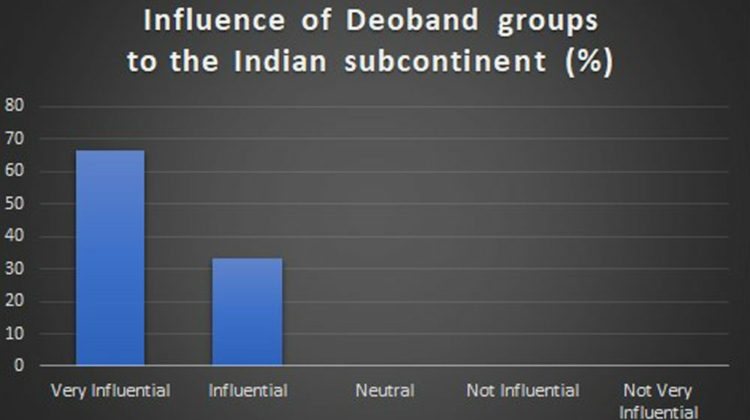
As the United States begins to draw down its forces in Afghanistan in accordance with the so-called peace agreement with the Taliban, the move could help bring attention to an oft-ignored branch of Islam — that is, the branch of Deoband Islam. Deoband is actually a city in north central India. In the 1860s, it was realized that the Deobandis had a very similar interpretation and approach to Islam as the Saudi Wahhabis. In other words, they are Salafi and practice the original form of Islam. Thus, they are pro-jihad and their goal is to implement Sharia law around the world. Take, for example, the Taliban who are currently making an attempt to re-establish the Islamic Emirate of Afghanistan (a totalitarian Islamic state), having taken possession of more territory in the South Asian country of Afghanistan since 9/11. Coincidentally, the Taliban itself is a Deobandi group.
In a recent online survey administered by the author and Animesh Roul (see below), 27 voluntary subjects were questioned about Deoband Islam. All of the participants were required to be in a field of homeland (internal) security or counterterrorism. Each participant was presented a short survey about the global Islamic Deoband movement — with particular interest on the Indian subcontinent, considering the origin of the movement. The average age of participants was 53. Seventeen subjects were male, while 10 were female. The participants’ countries of origin included the United States, India, Israel, United Kingdom, and Iran.
Interestingly, experts in any one of the fields of homeland (internal) security or counterterrorism agreed that a number of Darul Uloom Deoband-linked groups have contributed to the promotion of Jihad in the Indian subcontinent. These groups include Harkat-ul-Jihad al-Islami, Jaish-e-Mohammed, Jamaat-e-Islami Hind, Jamaat-e-Islami Pakistan, Jamaat ul-Ahrar, Jamaat-ul-Mujahedeen, Lashkar-e-Jhangvi, Tablighi Jamaat, Tamil Nadu Sunnath Jamaath, Tehrik-e-Taliban, Sipah-e-Sahaba Pakistan, Thowheed Jamaat, and of course, the Taliban.
A five-point Likert scale allowed participants to specify their level of agreement to a statement according to the following responses: very influential, likely, neutral, not influential, not very influential. Specially, when asked how influential these groups were to the Indian subcontinent, 18 (66.67%) of the respondents believed they were “very influential,” while nine (33.33%) respondents agreed they were “influential.”

All 27 of the survey participants believed monitoring of the Deoband madrassas operating throughout the world is a necessary step to for maintaining the sovereignty and national security of non-Islamic countries. However, this appears to come with a cost.
The likelihood of retaliation for being monitored was measured according to the following responses: very likely, likely, neutral, not likely, not very likely. If Deoband madrassas around the world were more closely monitored, 11 (40.74%) of the participants to the survey said violent responses from Islamic terrorists were “very likely” to occur. Eight (29.63%) said they were “likely” to occur, while five (18.52%) remained “neutral.” Only three (11.11%) believed violent responses were “not likely.”

Apart from the threat of individual Darul Uloom Deoband-linked groups, Al-Qaeda and ISIS also remain a great concern for the Indian subcontinent. While identifying whether Al-Qaeda or ISIS is currently the greater threat to the Indian subcontinent, 16 (59.26%) said it was Al-Qaeda. Eleven (40.74%) believe the greater threat to be ISIS.
Coincidentally, a London-based report released in March 2020 by Jane’s Terrorism & Insurgency Centre agrees. While the Islamic State continues to be a considerable threat, the Taliban has stripped the title from the murderous group as the world’s deadliest terrorist organization. Today, an estimated 60,000 Taliban fighters are active in Afghanistan.
The deep ties between the Taliban and other terrorist groups cannot be ignored. One such (underestimated) group, Al Qaeda in the Indian Subcontinent (AQS), exists to destroy the governments of Afghanistan, Bangladesh, India, Myanmar, and Pakistan.
When asked whether any of the aforementioned Deobandi-linked terrorist groups were co-opting /adding strengths (manpower and ideologically) to AQS, the majority of participants to the survey affirmed the idea. An overwhelming 23 (85.19%) responded “yes” while only four (14.81%) were “unsure.”
Participants were also asked which AQS-affiliate was presently considered to be the greatest threat to the India. Examples provided in the survey included Ansar Gazawat-ul Hind (Kashmir); Taliban formations (Afghan or Pakistan) or Ansar al Islam, Bangladesh; Harkat ul Mujahideen; and Base Movement (India).
The majority of participants (14 of them) split their responses between Harkat ul Mujahideen and the Taliban. Seven (25.93%) say it is Harkat ul Mujahideen and seven (25.93%) believe it to be the Taliban. Ansar Gazawat-ul Hind received five (18.52%) votes, and Ansar al Islam garnered three (11.11%). Both the Base Movement and Jaish-e-Mohammed received two (7.41%). And Lashkar-e-Taiba received a single (3.70%) vote.

While there remains a need for a more comprehensive study, this data provides valuable insight to the threat of Deobandi-linked terrorist organizations around the world. The dangers of the Deoband/Salafi branch of Islam extends to the United States, as well, as evidenced in its influence in the San Bernardino, California, shooting and Pulse Nightclub massacre in Orlando, Florida.
**Animesh Roul is the executive director of the New Delhi-based policy research group Society for the Study of Peace and Conflict.
Terry Bishop’s writings and interests focus on the strategic influence of terrorism and subversion, counter-terrorism and national security. His research includes armed conflict and violence in South Asia with a focus on al-Qaeda in the Indian Subcontinent (AQS), the Taliban, and other Deobandi-linked terror groups. His writings have been published by American Thinker, Defence & Security Alert, and Indian Defence Review.


Leave a Reply